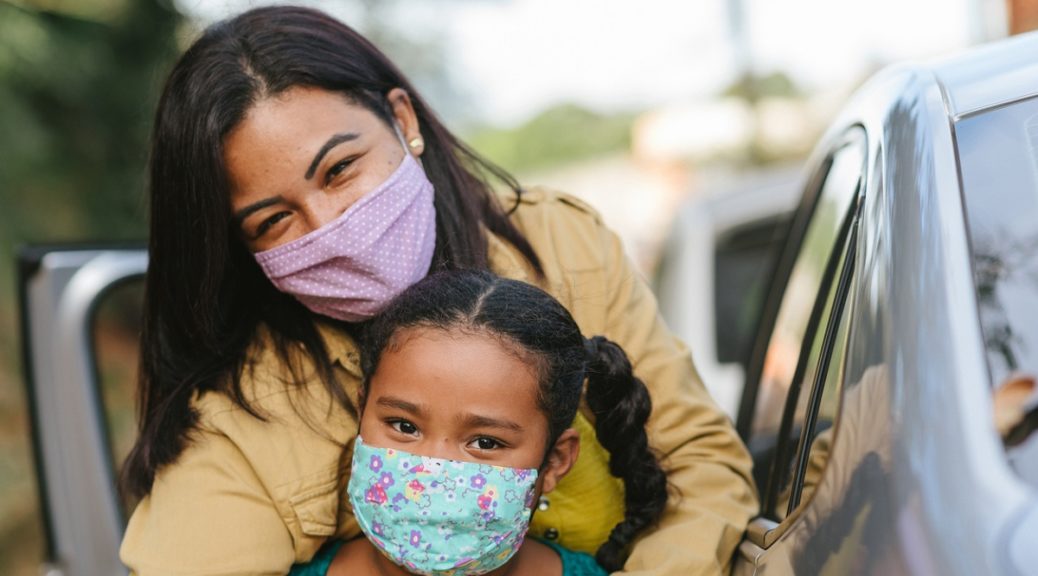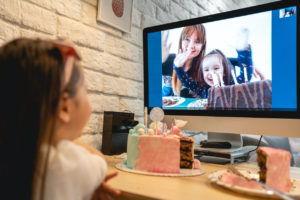How to Support Children’s Mental Health During the Ongoing COVID-19 Pandemic

The COVID-19 pandemic can be an immense source of stress and fear in children and teens, just like with adults. While you can’t change COVID-19, you can create a positive impact on children’s mental health as they continue to adjust to the “new normal.” Let’s look at how.
Watch for Signs of Information Overload and Mental Stress
News can be overwhelming. Constant distressing news coverage has added a lot of anxiety to our everyday lives and it’s normal for children to have a harder time processing those feelings.
Check in with your child regularly about how they are coping with the pandemic-related information they hear and see. You may also want to monitor how much news exposure your child has, including access to smartphones, social media, TV, etc. Remind kids that the information they hear from others can be biased, exaggerated, misinformed or untrue.
Setting aside specific times for screen-free family discussions can make a big difference in countering the media your child is experiencing throughout the day. Be open and offer comfort. Make sure they know they can come to you anytime they have questions. Children may be feeling more anxious because so much of what is happening around them is out of their control and directly impacts their daily routines. Remind them of things they can do to protect themselves, such as washing their hands frequently, keeping a safe distance from others and wearing a mask.
The goal of these conversations is to pinpoint their stressors or triggers. Once you understand what those are and how they’re affecting your child’s mental health, you can work toward solutions that best fit their needs.
Be Mindful of School Stress
Remember, even without COVID-19, the pressures of school can play a big part in children’s mental health. If your child is doing in-person school, explore what kind of fears they might have because of the pandemic. Talk through those fears with them and help them come up with coping techniques that can help when they feel overwhelmed. Check out this blog that shows you how to help your child create an emotion regulation plan.
You should also consider the effects of isolation for children who are staying home from school. In some cases, kids can experience increased depression from a lack of social interaction with peers. Schedule times for them to do virtual hangouts with friends so they can safely socialize from home.
While some youth are better able to cope with the current uncertainty, anxiety and stress may develop and grow intense for others. This type of stress can adversely affect their brain development and mental wellbeing if it isn’t addressed. Since the brain continues to develop throughout childhood and adolescence, building resilience is very important. This is essential for academic performance, critical thinking, healthy and appropriate relationships, being able to overcome future life challenges and more. Visit this blog for easy and fun activities to strengthen your child’s brain.
Help Kids Adapt to Their “New Normal”
The COVID-19 pandemic has significantly changed typical youth activities. Dances, class events, athletics, family trips, celebrations, and simple things like going to the movies are great for children’s mental health. However, COVID-19 has forced even the most regular activities to be altered for safety, if not temporarily postponed or outright canceled. Many families and kids are mostly staying home to maintain physical wellness, which is critical. Children and teens also need to feel their lives have purpose and meaning outside of remote class and quarantine, so we must get creative and come up with ways to still give them opportunities for social stimulation.
 Fortunately, following COVID-19 safety guidelines, there are activities you can still do with your kids safely. You can also help kids and teens build structure into their lives to make stay-at-home days more meaningful. Create schedules for their day beyond schoolwork, including time outside, exercise, and participation in social connections while maintaining social distancing. Something as simple as a regular family walk will give you and your child a break from the house. Zoom or FaceTime game nights with family and friends are great options, too.
Fortunately, following COVID-19 safety guidelines, there are activities you can still do with your kids safely. You can also help kids and teens build structure into their lives to make stay-at-home days more meaningful. Create schedules for their day beyond schoolwork, including time outside, exercise, and participation in social connections while maintaining social distancing. Something as simple as a regular family walk will give you and your child a break from the house. Zoom or FaceTime game nights with family and friends are great options, too.
It’s important to give kids an outlet for their school and COVID-19-based stress. Activities like yoga and other forms of exercise are vital de-stressing tools. Playing games and creating art also serve to boost creativity and escape the news and schoolwork.
Mental health challenges as a result of stress can become serious. Learn the warning signs to watch for to help you know if your child’s behavior may be indicating something more serious is going on.
Warning Signs of Children’s Mental Health Distress
Children and teens may have trouble expressing how they’re feeling so it’s important to watch for signs of mental health distress. Recognizing signs that your child may be struggling with their mental health is critical for getting them professional help before problems escalate.
Also, watch for behavioral changes. Children and teens may act aloof, but this might be their way of hiding their fears of how COVID-19 might affect them or loved ones. They might be worried about grandparents or parents who have chronic health problems or work in high-risk professions. When children deviate from regular behavioral patterns, this can indicate stress, fatigue or underlying trauma. Behavioral changes to watch for may include:
- Changes in sleeping habits, such as sleeping more or insomnia
- Changes in eating habits, such as eating a lot more or a lot less
- Signs of self-harm
- Substance use
- Acting out more than usual
- Complaints of body aches that aren’t due to a physical problem
- Isolating from family and friends more than normal
If you notice behavioral changes or other warning signs, address them as soon as possible. Let your child know it’s okay to feel sadness, fear or anger. It’s important that these feelings aren’t ignored and that they feel comfortable opening up. It’s also important to seek a professional assessment as soon as possible.
Camber (Previously KVC Hospitals) Can Help!
If you have a child between 6 to 18 struggling with depression, anxiety, suicidal thoughts, or trauma from this pandemic, Camber can help. Be sure to check out our many resources for Prioritizing Mental Health During COVID-19, including:
- And more…
Visit our blog for children’s mental health education and tips and visit our resource library for free guides, assessments and eBooks. COVID-19’s impact on kids’ mental health is serious, but this does not mean you need to help them alone.
About Camber (Previously KVC Hospitals)
For 30 years, Camber has helped thousands of kids and teens achieve mental health wellness through expert and compassionate treatment. Camber uses a patient-centered approach that works to heal the whole family unit when a child is struggling with depression, anxiety, suicidal thoughts, self-harming, the impacts of trauma, and other mental health needs. To learn more about our services including our internationally renowned expertise in trauma-informed care, visit cambermentalhealth.org or call us 24/7 at 913-890-7468.






